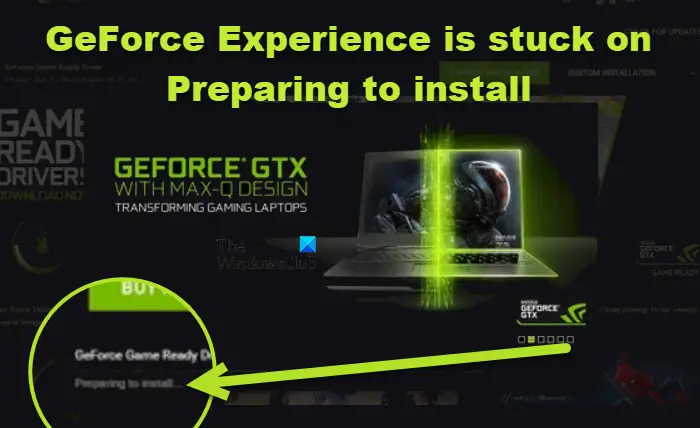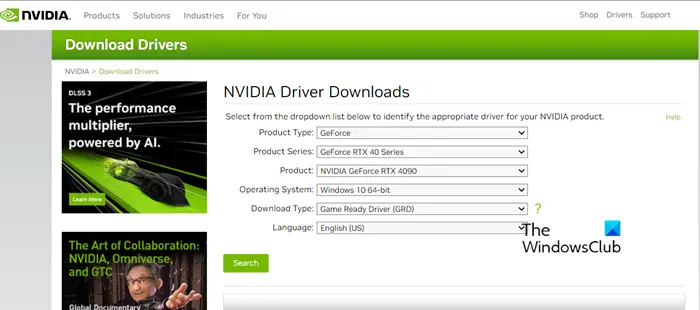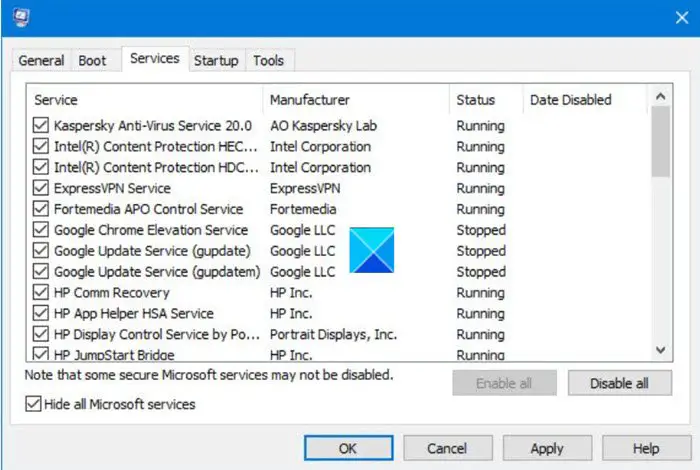NVIDIA is one of the biggest names in the Graphics card industry, probably, even the biggest. However, popularity doesn’t guarantee that your app will have no bugs or issues, it has been noted that NVIDIA GeForce is facing issues when trying to install drivers. According to victims, when trying to install the browser or update the same using NVIDIA GeForce, the installation process stuck on Preparing. In this post, we will see what you can do if NVIDIA GeForce Experience is stuck on Preparing to install.

Fix NVIDIA GeForce Experience is stuck on Preparing to install
One of the most common reasons why GeForce Experience doesn’t go past the Preparing to install screen is the lack of permissions or privileges. The user needs to grant these permissions by simply launching the GeForce application with administrative privileges. However, in case, a third-party app, a bug, or corrupted drivers can stop the GPU driver from getting updated.
If NVIDIA GeForce Experience is stuck on Preparing to install, follow the solutions, suggestions, and workarounds mentioned below to resolve the issue.
- Run NVIDIA GeForce with administrative privileges
- Reboot your system
- Download the driver manually
- Use other methods to update your Graphics Drivers
- Uninstall Nvidia to force Windows to install the driver
- Update in Clean Boot
Let us talk about them in detail.
1] Run NVIDIA GeForce with administrative privileges
The first thing we need to do is run the Nvidia GeForce with administrative privileges. This will get permission to access some of the files on your computer and the Internet to install the driver. To do the same, just right-click on the GeForce Experience and select Run as administrator. If you want to configure the settings of GeForce such that it always open with administrative privileges, you need to follow the prescribed steps.
- Right-click on the Nvidia GeForce Experience and select Properties.
- Go to the Compatibility tab.
- Tick Run this program as an administrator.
- Click Apply > Ok.
After making these changes, check if the issue is resolved.
2] Reboot your system
Next up, we need to reboot the system and see if that helps. Restarting will allow the computer to start all the required services again and install your driver quickly. You can combine this with the first solution to resolve the issue.
3] Download the driver manually

This is not a solution instead a workaround where you can just try to download the driver manually rather from the GeForce app. We will download the driver from the Nvidia website, as that too will ensure that the driver is authentic. Before doing the same, open Task Manager by Ctrl + Shift + Esc, right-click on GeForce Experience, and select End Task.
Now, navigate to nvidia.com, enter your product details, and download the driver. Once the driver is downloaded, just have to go to the Download folder, right-click on the file, and select Run as administrator. Finally, follow the on-screen instructions to download and install the NVIDIA driver. Hopefully, this will do the job for you.
4] Use other methods to update your Graphics Drivers
If your goal is to update your Graphics Drivers, then why stick with one method, there are other ways to do the same. Following are the methods to update your GPU driver on a Windows computer.
- Go to Windows Settings and install Driver and Optional Updates,
- Download and install a free driver update software and use it to update drivers.
- Update the driver from Device Manager.
This may not be a solution but is a workaround that you can always use whenever you want to update your device driver.
5] Uninstall Nvidia to force Windows to install the driver
Removing the existing Nvidia driver can force Windows to install the latest version of the driver from scratch. To do the same, just first need to remove Nvidia from your system. To do the same, open Settings, go to Apps > Installed apps or Apps & features, look for every Nvidia program such as GeForce Experience, Audio Driver, and PhysX System, and uninstall them. Once you have removed, the program, check for updates and allow it to install the missing software.
You can check for the driver from Device Manager > Display adapters. If you have an outdated Nvidia driver, just right-click on it and select Update driver. Once the driver is installed, check if the issue is resolved. In case, the driver is not installed, go to third-solution and do it manually.
6] Update in Clean Boot

In case, none of this worked or you want the GeForce apps to update the driver, go ahead and start your computer in Clean Boot. Make sure to not close any NVIDIA-related services as they will be used during the GeForce scan. If drivers are updated in Clean Boot, you need to enable services manually to find out which app is the culprit. Once you know why drivers were failing to get installed on your system, just remove the troublemaking program and you will be good to go.
Read: Fix NVIDIA GeForce Experience overlay not working on Windows PC
Mostly a slow hard disk is responsible for slowing down the installation process. But since the issue has been noticed on some of the most well-equipped computers, one can pretty easily see that there is something wrong with GeForce. If you want to resolve it or find any workaround to update drivers, this post will assist you.
Also Read: GeForce Experience cannot optimize Games on Windows PC.
Leave a Reply